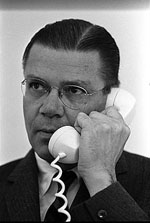McNamara's 'other' crimes: the stories you haven't heard
Source: findarticles.com
The outrage and condemnation that have greeted Robert McNamara's In Retrospect: The Tragedy and Lessons of Vietnam ignore two major scandals of that war which have led to continued pain, anguish, and suffering. McNamara, too, conveniently ignored them in his bloodless account of how he and his colleagues in the Kennedy and Johnson Administrations were "wrong, terribly wrong" about Vietnam. A few months after McNamara told Lyndon Johnson that the war was unwinnable, McNamara did his part to make Vietnam America's greatest class war with his brainchild, Project 100,000. At the same time, McNamara knew but remained silent about the highly toxic effects of Agent Orange. What the former Secretary of Defense omits in his book and during his talk show interviews bears review, particularly since there is the danger that the next generation will study McNamara's self-serving version in America's schools.
A few months after McNamara told Lyndon Johnson that the war was unwinnable, McNamara did his part to make Vietnam America's greatest class war with his brainchild, Project 100,000. At the same time, McNamara knew but remained silent about the highly toxic effects of Agent Orange. What the former Secretary of Defense omits in his book and during his talk show interviews bears review, particularly since there is the danger that the next generation will study McNamara's self-serving version in America's schools.In 1966, McNamara initiated the "Moron Corps," as they were piteously nicknamed by other soldiers. Billed as a Great Society program, McNamara's Project 100,000 lowered military enlistment requirements to recruit 100,000 men per year with marginal minds and bodies. Recruiters swept through urban ghettos and southern hill country, taking some youths with I.Q.s below what is considered legally retarded.
In all, 354,000 volunteered for Project 100,000. The minimum passing score on the armed forces qualification test had been 31 out of 100. Under McNamara's Project 100,000, those who scored as low as 10 were taken if they lived in a designated "poverty area." In 1969, out of 120 Marine Corps volunteers from Oakland, California, nearly 90 percent scored under 31; more than 70 percent were black or Mexican. Overall, 41 percent of Project 100,000 volunteers were black, compared to 12 percent of the rest of the armed forces. Touted as providing "rehabilitation," remedial education, and an escape from poverty, the program offered a one-way ticket to Vietnam, where these men fought and died in disproportionate numbers. The much-advertised skills were seldom taught.
McNamara called these men the "subterranean poor," as if they lived in caves. In a way they did; their squalid ghettos and Appalachian hill towns were unseen by affluent America. All the better for McNamara and his president Lyndon Johnson. Unmentioned in Project 100,000's lofty sounding goals was the fact that - as protest became the number-one course of study at America's universities - the men of the "Moron Corps" provided the necessary cannon fodder to help evade the political horror of dropping student deferments or calling up the reserves, which were sanctuaries for the lily-white.
Officials denied that the members of the "Moron Corps" were dying in higher numbers, but the irrefutable statistics embraced by mathematical whiz kid McNamara tell another story. Forty percent of Project 100,000 men were trained for combat, compared with 25 percent of general service. In one 1969 sampling of Project 100,000, the Department of Defense put the attrition-by-death rate at 1.1 percent. By contrast, the overall rate for Vietnam era veterans was only 0.6 percent.
"I think McNamara should be shot," said Herb DeBose, a black first lieutenant in Vietnam, who later worked with incarcerated veterans. "I saw him when he resigned from the World Bank, crying about the poor children of the world. But if he did not cry at all for any of those men he took in under Project 100,000 then he really doesn't know what crying is all about. Many under me weren't even on a fifth-grade level.... I found out they could not read .. no skills before, no skills after. The army was supposed to teach them a trade in something - only they didn't."
As for Agent Orange, McNamara knew about its potential deadly effects even as it was being used in Vietnam, and long before veterans came home to die or waste away from the herbicide's after effects.
McNamara remained silent for years as the government stonewalled Vietnam veterans who claimed Agent Orange caused their cancer or nausea or violent rages or numbness in limbs or birth defects in their children. Veterans' pleas for testing, treatment, and compensation continued to be ignored.
Finally, in 1983, Judge George Pratt, Jr. agreed to hear the lawsuit of Vietnam Veterans against Dow Chemical for conspiring to keep hidden the truth about Agent Orange. For the first time, documents released by Pratt provided a detailed look at what the company and the government knew about dioxin danger and when. In 1965, when the government was purchasing millions of pounds of Agent Orange, Dow's internal report stated that dioxin could be "exceptionally toxic" to humans and that "fatalities have been reported in the literature." Pratt noted that McNamara attended meetings where the human health hazards of dioxin were discussed. In addition, said Pratt, McNamara's Defense Department commissioned a study which noted the "health dangers of the herbicide" in 1967.
After the war, McNamara could do nothing to change the millions of deaths and injuries inflicted on Vietnamese and Americans. But just think what McNamara could have done had he championed the veterans and their families; they were pawns then, no more than faceless numbers. It seems as though they remain so today.
He could have worked, as Admiral Elmo R. Zumwalt Jr. continues to do, to gain compensation for those killed or injured by Agent Orange. Zumwalt feels it is the least he can do for having ordered the use of the chemical, which killed, among others, his own son. Zumwalt, however, authorized the use of Agent Orange in innocence, unaware of its toxicity. McNamara has no such excuse.
McNamara does have one last chance to go down as a redeemed man, instead of just another name from the past flacking his memoirs and reaping royalties. He could donate the proceeds of his best-seller to programs helping Vietnam veterans.
Thanks to McNamara, they could surely use them.
Myra MacPherson "McNamara's 'other' crimes: the stories you haven't heard - Robert McNamara". Washington Monthly. FindArticles.com. 06 Jul, 2009. http://findarticles.com/p/articles/mi_m1316/is_n6_v27/ai_17040672/
Gulf of Tonkin: McNamara admits "It didn't happen."
"Clip from "The Fog of War" explaining the context of "The Gulf of Tonkin" incident that was used as the excuse for starting the Vietnam "War" --- and that "It didn't happen."






















